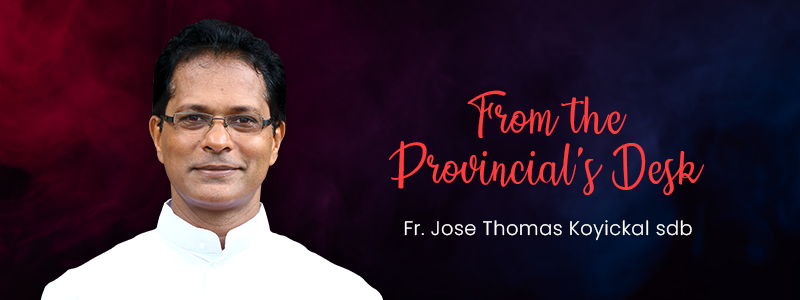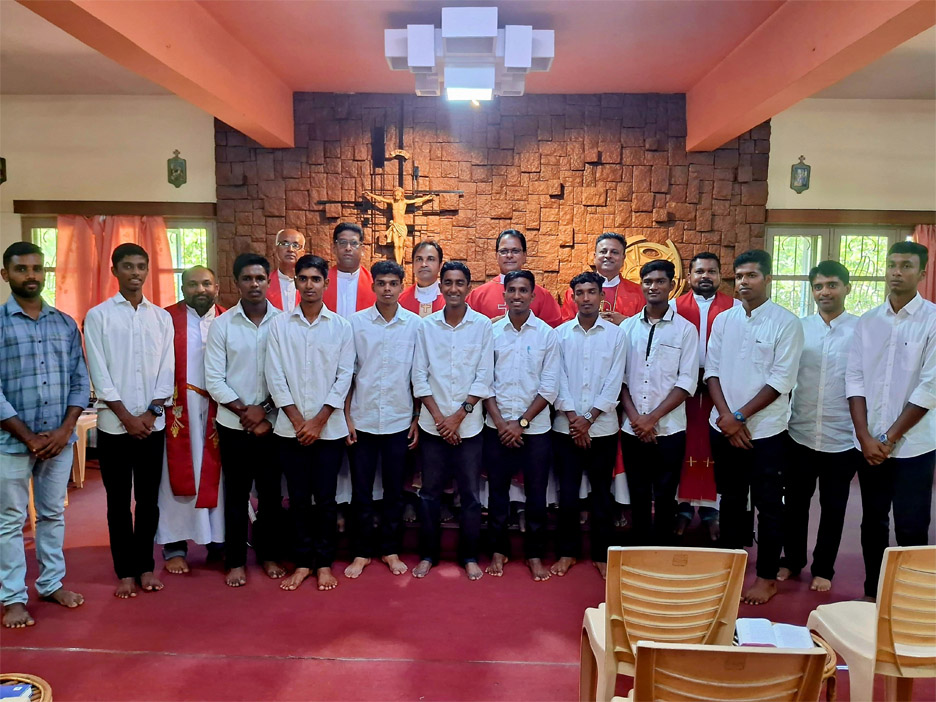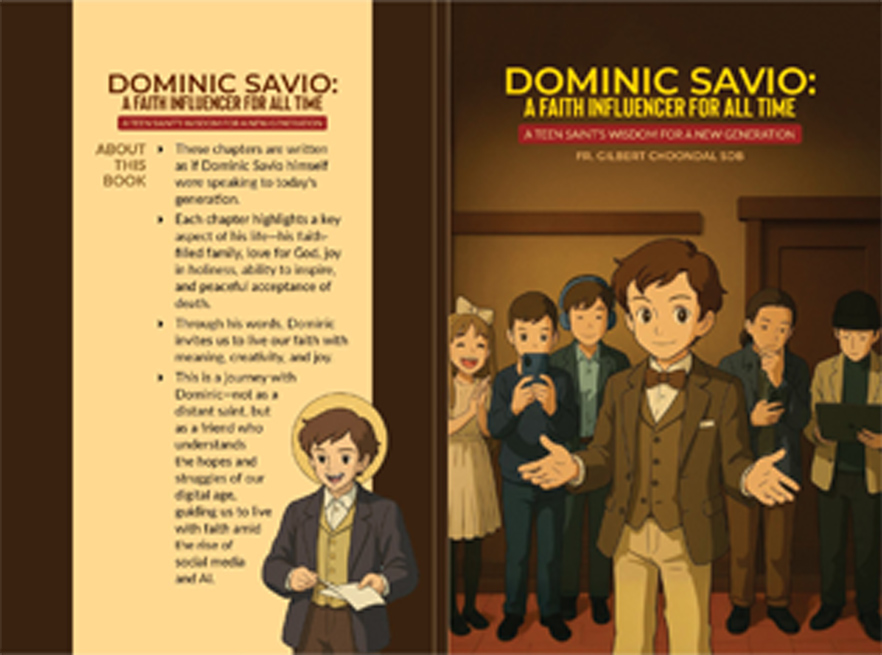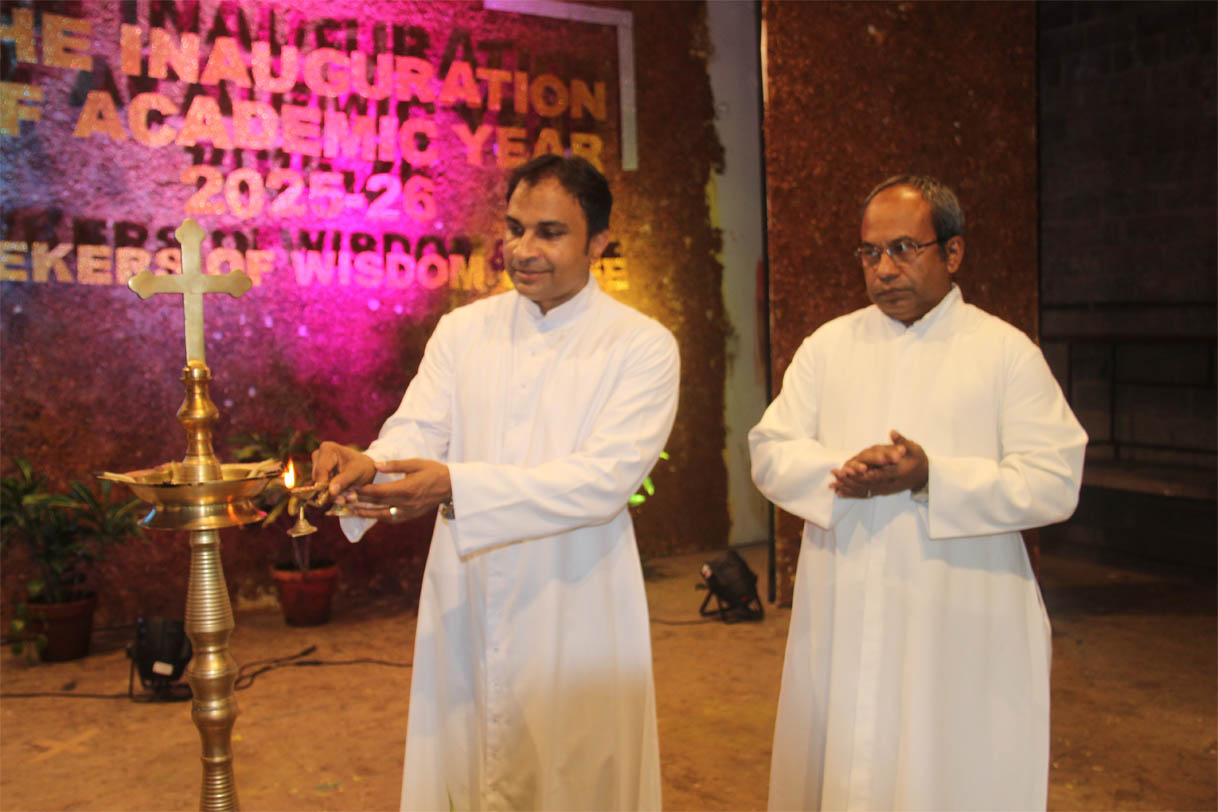
Dream of Don Bosco at Nine – The unfolding of his vocation and mission
There is nothing like a dream to create the future” (Victor Hugo). We believe that for Don Bosco dreams created his future. The dream at the young age of nine revealed God’s plan for him and the mission for which God had chosen him. This mission was to dedicate his life to children and young people in order to draw them away from evil and bring them nearer to God, ensuring the salvation of their souls. The dream of little Johnny Bosco at nine became a reality gradually when he became a priest and began his ministry for poor and abandoned youth. This dream has launched a vast movement of people and apostolates on behalf of the young that continues to respond to the questions, problems and needs of the young today.
Can dreams be a means through which God speaks to people? Many Christians frown upon any notion of dream interpretation, due to its apparent association with New Age divination, which is of course strictly forbidden (Catechism of the Catholic Church). This being said, what of the ample biblical evidence of God speaking to mankind through dreams, for instance to Daniel (Dan 2, 4), Joseph the son of Jacob (Gen 40), Joseph the husband of Mary (Matt 1:20; 2:20) and St Paul (Acts 16:9-15)? How do we square biblical revelation with what we now understand from modern psychology? A distinction must be made between dream divination and dream analysis. Divination seeks esoteric knowledge about future events via a medium other than God (e.g. a spirit). This is contrary to our faith – and even dangerous. Dream analysis, on the other hand, is morally neutral and only seeks to understand what has already been given. It is simply revisiting a dream that a person already had and discerning what the subconscious might be trying to tell.
We owe much to eminent Swiss psychologist Carl Jung for what is now universally accepted in modern psychology as dreams being the product of our subconscious minds trying to communicate with us. In our waking hours we often suppress emotions, thoughts and memories into our subconscious in order to keep focused on something else. This is not necessarily a bad thing, but oftentimes, what gets suppressed can contain truths that are key to our wholeness and freedom. For example, a CEO who constantly dreams of being chased may well be running away from his real-world responsibility, say as a father. Until this truth is consciously embraced, according to Jung, his dream of being chased is likely to recur. After sittings with thousands of clients Jung concluded that important thoughts and emotions that have been suppressed will always be trying to find ways to get our attention. This happens mostly through dreams when we are asleep as that is when our conscious minds are inactive.
Dream analysis attempts to discern what the unconscious is trying to communicate symbolically, and hence, it is certainly not the same as divination. Rather, it is a process of ascertaining the truth. If we take the Christian notion that God is Truth and “The truth will set us free” (John 8:32), then deciphering the compensatory imagery of dreams is but one process of arriving at truth – God. He is Lord and creator of both our conscious and subconscious minds! If he can speak to our conscious minds, he can certainly speak into our unconscious as well!
Scripture reveals that God sometimes communicates through dreams. In the Old Testament the patriarch Joseph’s dreams about sheaves and stars foretold that his eleven brothers would someday do him homage. Later Joseph’s ability to interpret prophetic dreams, in particular the Pharaoh’s, catapulted him to power and helped to feed the world during a famine. In Babylon, Daniel explained to King Nebuchadnezzar the dire meaning of his dreams for his country and his future. In the New Testament God spoke to St Joseph in dreams four times, telling him about Mary’s Son and later giving him directions for preserving his family from Herod’s wrath. The Magi, we recall, were warned in a dream not to report back to Herod.
Saints also received messages in dreams. St Patrick was guided in a dream to escape captivity. Later in another dream he was instructed to go to Ireland. Before St Dominic was born, his mother dreamed of a black and white dog carrying a burning torch. The Latin name for the Dominicans, who set the world on fire for God, is Domini canes (dogs of the Lord). So also, Don Bosco dreamed that vicious wolves were turned into lambs, a hint of his future work of transforming rough boys into persons of integrity.
But can God speak directly to us in our dreams? St Thomas Aquinas suggests proper discernment is necessary to ascertain the source and ‘God-content’ of any dream. He suggests that there can be a number of sources of dreams, many of which are natural such as the disposition of the body, the environment and the person’s emotional state (Aquinas, Summa Theologiae). He also suggests, however, that it is entirely possible that the Lord could speak directly through dreams. Just as with the Ignatian discernment of spirits, which acts upon natural human emotions and desires, so too can God work through the natural medium of dreams. But like Ignatian discernment, the origins and orientation of prophetic dreams must first be discerned, preferably with the help of a competent director.
According to Scriptural revelation and the greatest theologian who ever lived, it seems possible that God could, if he chooses, speak directly through our dreams. God is Truth, and any source of truth – conscious or unconscious – will never contradict faith or God himself. Certainly, Don Bosco’s dream at the age of nine “remained impressed on his mind for the whole of his life”! That dream was meant to enlighten and guide not only him but also many others. That dream is the founding story of an entire spiritual family. In it are condensed the constituent elements of a vocation, a mission, a charism. Indeed, the story clearly manifests the intent to leave a precious spiritual and pastoral legacy to future generations.
There is nothing more beautiful than recognising oneself being touched by God, called by name and sent in His name. It is an experience that fills the heart with humility and courage, with trust and hope, with love to receive and give. Don Bosco was not afraid to enter the world of young people: The Salesian Oratory and everything that arose from it, as the Memoirs of the Oratory tell us, was born as a response to the lives of young people with a face and a story, which spurred that young priest making it impossible for him to remain neutral or immobile in the face of what was happening. Don Bosco, like Jesus, was neither indifferent nor inert; rather, in an act of response to the appeals of the Lord entered into an “act of permanent conversion”, which involved and complicated “his whole life and the lives of those around him”.
The fact that a charism and spirituality such as Don Bosco’s is unveiled through a dream is something very significant. The night-consciousness that is proper to dreams is like an open door to the mystery, expressing the primacy and initiative of God and at the same time making one humble and courageous because it is authored by the wisdom and power of God, not one’s own intelligence and resourcefulness, nay, despite one’s own limitations and drawbacks. The person who surrenders himself to God’s dream is certain to accomplish His work! Dream and vocation are thus related. Their common trait is the obscurity of the details. It is so “because the message comes from God, and not in spite of coming from God” (K. Rahner), and then because it speaks of a future that is not so much imagined as travelled. Another trait common to dreams and vocation lies in the fact that the images and inspirations are not ideas but commands, not illustrations but injunctions. In every vocation the road is not known at the start, but opens up by walking. It is always like this: one understands what one lives, and one’s intelligence expands with obedience and initiative.
There is a detail in Johnny Bosco’s dream at the age of nine which expresses something very instructive about every vocation and mission and which unites John Bosco’s vocation to all the great vocation scenes in the Bible. It is an unfailing sense of turmoil which runs through the soul of the one called when faced with the initiative of God: the unpredictability of His initiative, the disproportion of what He asks of us, the sense of inadequacy that seizes the creature. In the voice of God who calls to Himself and sends us into the world something greater than us and our possibilities is demanded, something that displaces and exceeds our expectations, that blows away any desire for mastery or claim to control. Only an unconditional surrender is demanded, and when this happens, then the one called is no longer at the mercy of his own strengths or weaknesses, his own limited vision or uncertain initiatives, but is guided and directed by the light of God, by the power of the Spirit.
The experience of the turmoil before God’s greatness and His demands is the experience of Moses, who feels inadequate to the task entrusted to him despite God’s command (Ex 3, 11); it is the experience of Jeremiah who feels too young and unable to speak (Jer 1, 6); it is the experience of Peter who twice manifests his unworthiness: “get away from me, for I am a sinner” (Lk 5, 8), “I am going back to fishing” (Jn 21, 3). It is also the experience of Isaiah, who feels lost before the manifestation of God’s holiness in the temple because of his “unclean lips” (Is 6, 5), as well as that of Amos, who compares the strength of the divine Word by which he feels gripped to the roar of a lion (Am 3, 8); it is also the experience of Paul at the existential reversal effected by the encounter with the Risen One (Acts 9:1-9); it is the experience even of Mary who, though all holy and full of grace, “was troubled” at the Angel’s greeting “and wondered what the meaning of such a greeting was” (Lk 1:29). It happens like this in different forms and to different degrees in all the great vocations. Although experiencing the allure of God’s seduction, biblical men and women do not throw themselves headlong into the adventure of the mission, instead manifest fright and hesitation in the face of something that overwhelms them.
As Don Bozzolo observes in his study on Don Bosco’s dream at the age of nine, even in the account of Don Bosco’s vocation there is something surprising that must attract our attention: “While for the boys the dream ends in celebration, for John it ends in dismay and even tears”. But how? A party that ends in weeping? And does it end like this for John Bosco, the one who will be the apostle of “holy cheerfulness” and who will teach the boys that “sanctity consists in being cheerful”? Let us try to understand – first of all in Christian light and then in Salesian colouring. Our election is rooted in the election of Christ, but the Chosen One is the Crucified One and it is the Crucified One who is ultimately the Risen One. Therefore, Christian existence will always be, in a thousand different ways, an Easter existence, a profound interweaving of joy and cross, of love and pain, of life and death. One must know this, so as not to be found unprepared in the face of life’s trials, contradictions, injustices, humiliations and bitterness. Otherwise the heart weakens or hardens, becomes discouraged or stubborn, succumbs to the weight of the world’s evil or of one’s own sins. The Christian’s condition is truly paradoxical: he lives in the world but is a stranger to the world; he loves the world and the world hates him. Against the background of His joy and in view of His cross Jesus made this clear in many ways: “If the world hates you, know that it has hated me before you” (Jn 15:18), “You will be hated by all because of my name; but he who endures to the end will be saved” (Mt 10:22), “I have told you these things so that you may have peace in me. You will have tribulation in the world, but have confidence; I have overcome the world” (Jn 16:33).
The contrast in the dream between the joy of the boys and John’s dismay is due to the fact that Christian joy and Salesian joy are not deceptive euphoria, pure entertainment, simple light-heartedness, but are an inner resonance of the beauty of Grace, an awareness that “the Lord is near” (Phil 4:5), that joy is the first gift of the Risen Lord (Jn 20:20) and the first fruit of the Spirit (Gal 5:22). Therefore, the posture of joy “can only be achieved,” Bozzolo explains, “through demanding spiritual battles, the price of which Don Bosco will largely have to pay for the benefit of his boys. He will thus relive in himself that exchange of roles rooted in the paschal mystery of Jesus”. The dream at the age of nine echoes the experience of Jesus who, “in exchange for the joy that was set before him, submitted himself to the cross, despising the ignominy”, but just like that “he sat down at the right hand of the throne of God” (Heb 12,2), and it directs John to the condition of the apostles: “We are foolish because of Christ, you are wise in Christ, we are weak, you are strong; you are honoured, we despised” (1 Cor 4:10), but just so “co-workers in your joy” (2 Cor 1:24).
In the dream of Don Bosco as a nine-year-old child, Jesus and Mary point out John’s mission in broad strokes: the field of work (poor and abandoned children), the educational method (not with force or threats, but with charity and kindness), the attitude to be adopted (make yourself humble, strong and robust), his teacher and support (Mary Help of Christians), the results of this commitment (transformation of wolves into lambs). Salesianity was born precisely from this encounter capable of arousing prophecies and visions: to welcome, integrate and make the best qualities grow as a gift for others, especially for those marginalized and abandoned from whom nothing is expected. Dreams for Don Bosco were prophecies destined to come true. The dream brought him forward in faith, pushed him to dare the unimaginable, to risk it all. It is God who, through dreams, accompanied him step by step, making him a prophet for the good of all young people, excluding none. We all have dreams we carry in our hearts, and our task is to understand and make them concrete by following what the Lord tells us. “Let sleep itself be an exercise in piety for, such as our life and conduct have been, so also of necessity will be our dreams,” Saint Basil.
Affectionately in the Lord,
Fr. Jose Thomas Koyickal sdb,
Provincial
-
LENT: A JOUR...
29 March 2025 -
“ANCHORED IN...
14 February 2025 -
JUBILEE 2025...
08 February 2025 -
THE BIRTH OF...
08 January 2025 -
MONTH OF NOV...
13 November 2024 -
REDISCOVERIN...
13 October 2024 -
SYNODALITY A...
13 September 2024 -
INDEPENDENCE...
04 August 2024 -
THE SACRED H...
04 August 2024 -
THE SPIRITUA...
04 August 2024










